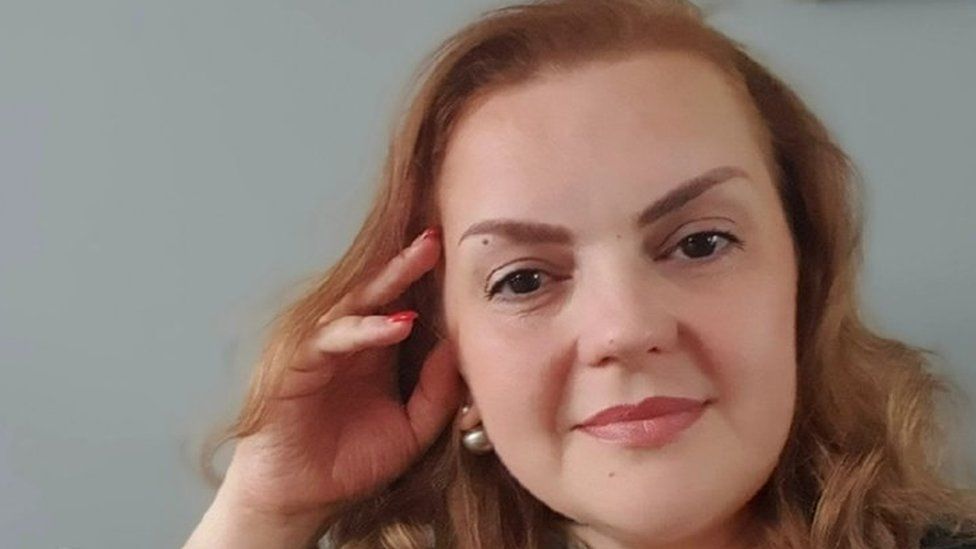“Whenever the blackouts hit, I automatically start swearing,” laughs Inna Pochtaruk.
Expressing yourself this way is a healthy reaction, the 45-year-old says, because “anger equals energy for action” and can help us protect personal boundaries.
As a therapist in Ukraine during the war with Russia, she treats patients suffering grief, guilt, anger, fear, isolation and feelings of powerlessness, but that doesn’t mean she herself is immune.
So she and about a dozen others meet every fortnight over Zoom – wi-fi connections permitting – to offer mutual support and receive free clinical supervision from two therapists based in London, all mediated by a Ukrainian translator called Max.
“The most difficult thing has been the prolonged, full-scale threat of death,” says Svetlana Koval, 47, also a therapist.
The war forced her to flee her hometown and move to the city of Odesa, leaving her elderly mother behind. Although her mother has a support network and Svetlana speaks to her regularly, she still ends each conversation feeling hopeless.
There are no quick fixes but hobbies, therapy and coping mechanisms help Svetlana through.
“I’ve been ballroom dancing for two years,” she says, smiling. “But it’s a small community with very few men, unfortunately.” Many have been conscripted into the army.
Small joys are far from frivolous in times of hardship, say the therapists. Yoga, gardening and cups of tea are some of their favourite ways to look after themselves – much like anywhere else in the world.
But being joyful has become taboo during the war, they tell the BBC, because a lot of Ukrainians think they should suffer in solidarity with others.
‘Forced to choose a side’
“I ended all of my relationships with any Russians because I’m angry and I’m not ready to continue them,” says Larysa, a psychology student in her 20s whose name we have changed.
Deep anti-Russian feeling has spread since the invasion began and destroyed many relationships. It is known as “splitting” or “black-and-white thinking” in psychology, and the therapists admit it has affected them too.
“It’s as if I see a middle split between two chairs. And I have to choose one side in order not to get split apart,” says Svetlana. “There were Russian colleagues I had to say goodbye to – I can’t work with them because I see fault in their behaviour in not being able to separate good from evil.”
The feeling is widely shared. “How can you work with victims if you justify violence?” asks another group member.
Some of the therapists gently suggest this anger would be better directed at President Vladimir Putin and his invading army, not Russian colleagues.
But others point out that black-and-white thinking evolved to help people survive times of acute danger.
“The amygdala part of the brain is like a fire alarm – it’s linked to anxiety and controls ‘freeze’, ‘run’, ‘fight’ reactions, and it signals about life and death situations,” explains Larysa.
There is a paradox at the heart of being a therapist when your country is at war, it seems.
If the goal of therapy is to dismantle defences so that people can feel things and deal with them, how do you reconcile that with a terrifying and traumatic environment where those same defences can actually keep you alive?
Shelling, explosions and blackouts sometimes disrupt online sessions with vulnerable clients, the therapists tell the BBC. But they are determined to keep offering a safe space for clients to sit with difficult feelings and work through them.
“We will win. We just need time, and I’m not sure how long,” says Svetlana, adding: “I’ve got no weapon but knowledge”.


One day the war will be over. But the psychological toll may last for generations.
The therapists tell the BBC they suffer some of the same traumas as their clients, although they try not to project their own feelings onto their patients.
One member of the group says she has lost her son. Her bereavement is still raw and very difficult to talk about but through it all she has learnt that, as a therapist, “you can’t take somebody further than you’ve been yourself”. Empathy comes of suffering.
‘My work energises me’
Money is another worry for these therapists, all of whom helped patients for free when the war robbed them of their livelihoods.
Inna is happy to have found paid, full-time therapy work. In fact, her new schedule of crisis services and youth support is so full-on that she says she will no longer attend these fortnightly therapists’ meetings.
“I love my work and it doesn’t exhaust me, it actually energises me. Yesterday I led a group and I was getting text messages until 11pm from people saying how grateful they were.”
Larysa makes a living as a photo editor for international magazines and brands, and has recently set up a private psychotherapy practice that is mostly free of charge to help the most needy.
“My husband jokes that it cost us a pretty penny to run my therapy business and pay for all the supervision whilst I was getting nothing in return,” she says, “but thankfully we had some savings from before the war, and my husband’s solidly employed.”
The therapists know that their work is vital and want to secure more paid work so they can reach more civilians and soldiers in need, while also sustaining themselves financially and avoiding emotional burnout.
“This is what sets us apart from the people attacking us. Giving refuge to people is a form of humanity,” says Larysa.
“And when I do that, I feel human.”
Related Topics
- Russia-Ukraine war
- Mental health
- Ukraine
